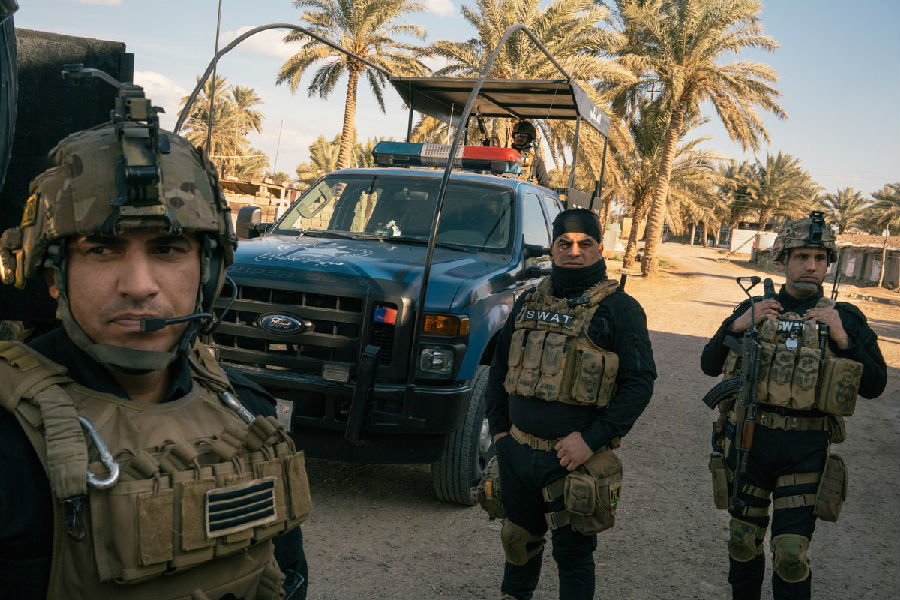Our policy is to prevent it, rather than being able to stand up to it if it happens again. We have to be ready.
“我們的政策是預(yù)防這樣的攻擊而不是在它再次發(fā)生時(shí)頂住它。我們必須做好準(zhǔn)備。”
DEEP INSIDE Baghdad’s heavily fortified Green Zone sits the opulent, sprawling edifice that until 2003 served as Saddam’s Republican Palace,
深入巴格達(dá)守衛(wèi)森嚴(yán)的綠色管制區(qū)就到了龐大而富麗堂皇,2003年前一直是薩達(dá)姆共和黨的宅邸的地方。
with four 13-ft. bronze busts of the dictator on the rooftop, visible for miles around.
屋頂上矗立的4個(gè)高達(dá)13英尺(約4米)的薩達(dá)姆青銅半身像遠(yuǎn)在數(shù)英里之外就能看見。
The busts are long gone.
只是,半身像早已不復(fù)存在。
And now, down those same long marble corridors where Saddam once ruled with an iron grip is the office of al-Abadi, who has been charged with creating a prosperous country out of postwar Iraq.
如今,那些曾被薩達(dá)姆鐵腕統(tǒng)治的大理石走廊的盡頭已經(jīng)成了肩負(fù)著在戰(zhàn)后伊拉克創(chuàng)建一個(gè)繁榮國(guó)家的重任的阿巴迪的辦公室。
It is a daunting mission.
這是一項(xiàng)艱巨的任務(wù)。
Al-Abadi, 65, seems an unlikely figure to have landed the role.
現(xiàn)年65歲的阿巴迪看起來(lái)完全不像能擔(dān)任這一角色的人物。
Short and soft-spoken, he does not look like the textbook version of a war hero,
他說(shuō)話簡(jiǎn)短而溫和,看起來(lái)并不像教科書里描述的那種戰(zhàn)爭(zhēng)英雄,
yet he has been cast as one in his election campaign.
然而,競(jìng)選期間他確實(shí)被人們視為了戰(zhàn)爭(zhēng)英雄。
Billboards around Baghdad highlight his role as Iraq’s military commander in chief, who brought the country back from the brink.
巴格達(dá)周邊的廣告牌都把他描繪成了拯救這個(gè)國(guó)家于破碎邊緣的伊拉克軍事總司令。
An electrical engineer raised in Baghdad, al-Abadi spent more than 20 years in exile in London during Saddam’s regime.
薩格達(dá)執(zhí)政期間,作為一名在巴格達(dá)長(zhǎng)大的電氣工程師,阿巴迪在倫敦一流亡就是20多年。
He flew home in 2003, just as the U.S. invasion began.
2003年美國(guó)入侵伊拉克一開始,他就飛回了祖國(guó)。

As a member first of the governing council and then Iraq’s parliament,
他先是出任了伊拉克管理委員會(huì)委員,之后又成了伊拉克議會(huì)的一員,
he witnessed firsthand the turmoil that followed 2003, which cost 4,500 American lives and an estimated 460,000 Iraqi ones.
他親眼目睹了2003年之后那場(chǎng)奪走了4500名美國(guó)人,預(yù)計(jì)46萬(wàn)名伊拉克人性命的動(dòng)亂。
The invasion uncorked lethal enmities,
美國(guó)的入侵為致命的敵意打開了缺口,
with Saddam’s hard-line Sunni loyalists staging a bloody insurgency against the U.S. military and their Iraqi allies,
薩達(dá)姆的強(qiáng)硬派遜尼派忠誠(chéng)分子對(duì)美國(guó)軍隊(duì)及其伊拉克盟友發(fā)起了一場(chǎng)血腥的叛亂,
and Shi'ite groups waging battle against both U.S. forces and Sunnis.
什葉派組織則發(fā)動(dòng)了針對(duì)美國(guó)軍隊(duì)和遜尼派雙方的戰(zhàn)斗。
Iraq has, to many, become shorthand for the unintended consequences of U.S. intervention,
對(duì)許多人來(lái)說(shuō),伊拉克都已成為美國(guó)干預(yù)他國(guó)政治結(jié)果卻引發(fā)了意外后果的代表案例,
and has put American foreign policy on a more isolationist path.
與此同時(shí),它也將美國(guó)的外交政策推上了更加孤立的道路。
President Trump says it was a "mistake” for the U.S. to have intervened.
特朗普總統(tǒng)說(shuō),美國(guó)出面干預(yù)伊拉克就是一個(gè)“錯(cuò)誤”。
The Sunni insurgency after 2003 seeded a murderous terrorist cell, al-Qaeda in Iraq,
2003年后遜尼派的叛亂活動(dòng)在伊拉克為兇殘的恐怖集團(tuán)——“基地組織”的誕生埋下了種子。
which later morphed into a group with designs on the country itself: the Islamic State of Iraq and Greater Syria, or ISIS.
該組織后來(lái)便演變成了一個(gè)對(duì)伊拉克整個(gè)國(guó)家都開始指手畫腳的團(tuán)體:伊拉克和大敘利亞伊斯蘭國(guó),簡(jiǎn)稱ISIS。
譯文由可可原創(chuàng),僅供學(xué)習(xí)交流使用,未經(jīng)許可請(qǐng)勿轉(zhuǎn)載。


